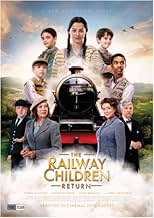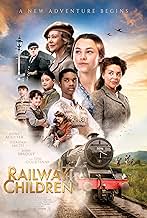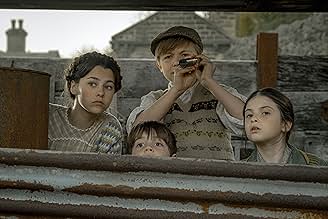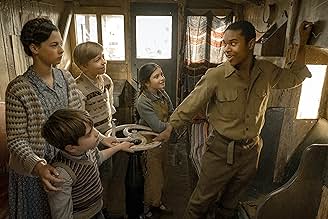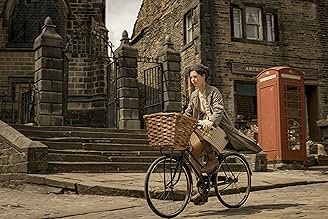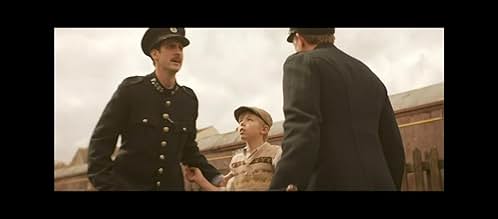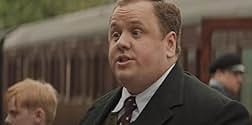IMDb-BEWERTUNG
5,5/10
1716
IHRE BEWERTUNG
Folgen Sie einer Gruppe von Kindern, die während des Zweiten Weltkriegs in ein Dorf in Yorkshire evakuiert werden, wo sie auf einen jungen Soldaten treffen, der wie sie weit weg von zu Hause... Alles lesenFolgen Sie einer Gruppe von Kindern, die während des Zweiten Weltkriegs in ein Dorf in Yorkshire evakuiert werden, wo sie auf einen jungen Soldaten treffen, der wie sie weit weg von zu Hause ist.Folgen Sie einer Gruppe von Kindern, die während des Zweiten Weltkriegs in ein Dorf in Yorkshire evakuiert werden, wo sie auf einen jungen Soldaten treffen, der wie sie weit weg von zu Hause ist.
- Auszeichnungen
- 1 Nominierung insgesamt
Liam Dillon
- Amercian Officer
- (as Liam Dhillon)
Micky Williams
- Children's Dad
- (as Mickey Williams)
Empfohlene Bewertungen
Having seen the original Railway Children numerous times since it was first released in 1970, I had high hopes for this film, on the basis that Jenny Agutter had agreed to appear in it. However, I was sorely disappointed, as historical inaccuracies and retrospective applied politically correct ideas totally ruined the film for me. To give just a few examples:
The film is based on children being evacuated from Manchester in 1944 in response to a renewed German bombing offensive. While such an offensive did occur (and was known as the Baby Blitz) it was largely concentrated on London and the south east of England.
Bobbie's grandson, Thomas, had a far too broad Yorkshire accent for someone from a middle-class family.
Lily would not have been detained for a prolonged period by the American MPs, but would have been handed over to the British police at the earliest opportunity.
The British policemen would have been wearing helmets and not flat caps.
Lily seeking to hide Abe's army uniform by giving him civilian clothes is completely ludicrous, as he would have been immediately identifiable by his skin colour (or perhaps color).
A young man with Down's syndrome would not have been employed as a telegraph boy at that time.
The American general at the end of the film would not have been black.
The film is based on children being evacuated from Manchester in 1944 in response to a renewed German bombing offensive. While such an offensive did occur (and was known as the Baby Blitz) it was largely concentrated on London and the south east of England.
Bobbie's grandson, Thomas, had a far too broad Yorkshire accent for someone from a middle-class family.
Lily would not have been detained for a prolonged period by the American MPs, but would have been handed over to the British police at the earliest opportunity.
The British policemen would have been wearing helmets and not flat caps.
Lily seeking to hide Abe's army uniform by giving him civilian clothes is completely ludicrous, as he would have been immediately identifiable by his skin colour (or perhaps color).
A young man with Down's syndrome would not have been employed as a telegraph boy at that time.
The American general at the end of the film would not have been black.
As you might expect from an attempt to re run a beloved classic there is a certain air of somewhat cynical box checking about The Railway Children Return but some charm does manage to sneak through.
This time round children are sent to the country to escape the blitz rather than just having to slum it with the yokels because daddy has legal problems. This set up allows Jenny Agutter to return as the grown up matriarch of a family taking in the new generation of railway kids. She seems to be enjoying herself but doesn't really have much to do. This is the same for most of the adult characters in the film, thinly drawn but likeable (apart from one insufferable old uncle who turns up purely to spout ra ra nonsense).
This makes sense as it is the railway "children" after all. Some of the child acting is, to be kind, a mixed bag but it never derails proceedings and there is only so much a young actor can do with insightful lines like, "I hate war, I hate it!"
The plot, such as it is, involves a runaway soldier and institutional racism. Fortunately, only the American military are racist (although they still promote black soldiers far up the ranks so i guess we are meant to think they aren't all bad) as the citizens of a quant English village would never indulge in such behaviour. To call the events of the movie a plot is actually a bit of stretch, things happen for a while and then just sort of resovle themselves without much explanation of how everynody came together.
The Railway Children Return isnt a complete waste of time but is likely to be quickly forgotten. Probably as soon as the credits roll.
This time round children are sent to the country to escape the blitz rather than just having to slum it with the yokels because daddy has legal problems. This set up allows Jenny Agutter to return as the grown up matriarch of a family taking in the new generation of railway kids. She seems to be enjoying herself but doesn't really have much to do. This is the same for most of the adult characters in the film, thinly drawn but likeable (apart from one insufferable old uncle who turns up purely to spout ra ra nonsense).
This makes sense as it is the railway "children" after all. Some of the child acting is, to be kind, a mixed bag but it never derails proceedings and there is only so much a young actor can do with insightful lines like, "I hate war, I hate it!"
The plot, such as it is, involves a runaway soldier and institutional racism. Fortunately, only the American military are racist (although they still promote black soldiers far up the ranks so i guess we are meant to think they aren't all bad) as the citizens of a quant English village would never indulge in such behaviour. To call the events of the movie a plot is actually a bit of stretch, things happen for a while and then just sort of resovle themselves without much explanation of how everynody came together.
The Railway Children Return isnt a complete waste of time but is likely to be quickly forgotten. Probably as soon as the credits roll.
I gave up half way through & I rarely do that, some part of me has faith that things will improve, they really didn't!!!
I can't remain PC & give this my honest opinion, but do anything with your time rather than spend it watching this!!
It does of course have Jenny Agutter, but she should not have lowered herself to be involved!!! Lionel Jeffries would be turning in his grave.
I'd watch the original any time, but not this ridiculous pile of ****!
Didn't even see much in the way of actual trains or railways to be honest, just some carriages in a siding!
I wanted it to relight the childhood feelings that the original did, I wanted it to be at least watchable & ideally good, alas no!!!!
Do yourselves a favour and don't bother!!
I can't remain PC & give this my honest opinion, but do anything with your time rather than spend it watching this!!
It does of course have Jenny Agutter, but she should not have lowered herself to be involved!!! Lionel Jeffries would be turning in his grave.
I'd watch the original any time, but not this ridiculous pile of ****!
Didn't even see much in the way of actual trains or railways to be honest, just some carriages in a siding!
I wanted it to relight the childhood feelings that the original did, I wanted it to be at least watchable & ideally good, alas no!!!!
Do yourselves a favour and don't bother!!
There is nothing inherently wrong with this film, it is very sweet, quaint and positively intoxicating with its timeless charm of trains in the Yorkshire countryside. But the audience need something more to keep The film from being boring; it is simply not enough to recycle the same locations and the same plot points because from very early on this film just becomes a predictable tribute to the superior 1970s version.
An interesting point to note is how everyone from film critics to members of the public have complained about the secondary theme regarding racial inequality. Nobody was expecting nor wanted this theme in the film and subsequently it is quite jarring and feels out of place according to many people. I for one argue that in order for a period film to be successful nowadays it has to carry social related issues such as racial inequality in order for it to be able to relate to the wider public. After all, we are now so much more aware of racial related issues, ignoring it is hard to do.
In spite of the beautiful shots there was a really terrible continuity errors that were next to unforgivable and the hammy acting. Of the children left much to be desired when it came down to the casting director's choices.
This film will mostly have a fondness towards it, but it's destined to be consigned to TV as a Sunday afternoon filler.
An interesting point to note is how everyone from film critics to members of the public have complained about the secondary theme regarding racial inequality. Nobody was expecting nor wanted this theme in the film and subsequently it is quite jarring and feels out of place according to many people. I for one argue that in order for a period film to be successful nowadays it has to carry social related issues such as racial inequality in order for it to be able to relate to the wider public. After all, we are now so much more aware of racial related issues, ignoring it is hard to do.
In spite of the beautiful shots there was a really terrible continuity errors that were next to unforgivable and the hammy acting. Of the children left much to be desired when it came down to the casting director's choices.
This film will mostly have a fondness towards it, but it's destined to be consigned to TV as a Sunday afternoon filler.
It was a good idea to update the railway children story of the Second World War but an absolutely dumb idea to put modern ideas of racism - presumably to please the woke crowd - into it. Come on this is a children's film. We know that racism existed in the American army but the enemy was not the Americans but the Nazis. Even the murderous Joe Stalin was on our side! The idiots who rewrite history like this give our children the wrong idea, that somehow the brave lads who went to war against one of the most murderous regimes ever were the bad guys. These things are just totally annoying and totally out of place in children's films. Another example of woke virtue signalling. The movie could've been made a lot more entertaining with a lot better and more imaginative screenplay. Hopeless!
Wusstest du schon
- WissenswertesUtilises the same Yorkshire locations as the 1970 film this story follows.
- PatzerThe blackout did not appear to be in force in Oakworth. In many scenes, from Lily climbing out of the window and running down the field with a torch, to front doors being opened in a blaze of light, there was no indication that a blackout was in force at all.
Blackout regulations started on 1st September 1939 and ended in May 1945. Rules were relaxed slightly in September 1944, but only to allow very low levels of lighting, no brighter than moonlight.
Lily's torch would have been pasted over with dark paper to dim the beam, or black paper with a slit in it.
Top-Auswahl
Melde dich zum Bewerten an und greife auf die Watchlist für personalisierte Empfehlungen zu.
- How long is The Railway Children Return?Powered by Alexa
Details
- Erscheinungsdatum
- Herkunftsländer
- Offizieller Standort
- Sprache
- Auch bekannt als
- Railway Children
- Drehorte
- Produktionsfirmen
- Weitere beteiligte Unternehmen bei IMDbPro anzeigen
Box Office
- Bruttoertrag in den USA und Kanada
- 466.391 $
- Eröffnungswochenende in den USA und in Kanada
- 245.904 $
- 25. Sept. 2022
- Weltweiter Bruttoertrag
- 4.298.731 $
- Laufzeit
- 1 Std. 39 Min.(99 min)
- Farbe
- Seitenverhältnis
- 2.35 : 1
Zu dieser Seite beitragen
Bearbeitung vorschlagen oder fehlenden Inhalt hinzufügen







